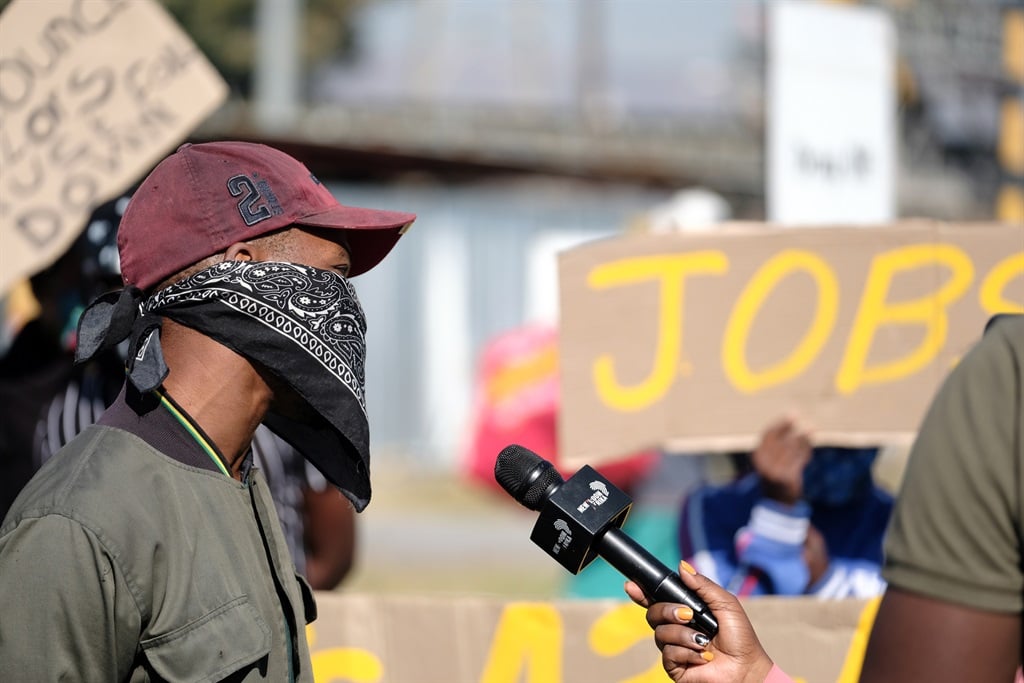
South Africa’s headline unemployment rate hit a record high of 34.4% in the second quarter of 2021, up from 32.6% in the first three months of the year as businesses shed staff resulting from the devastating economic impact of the Covid-19 lockdown.
This rate was the highest since Stats SA’s Quarterly Labour Force Survey began in 2008, with a total of 7.826 million people out of work in the three months to the end of June 2021.
According to the expanded definition of unemployment, which includes those discouraged from seeking work, 44.4% of the labour force was without work in the second quarter, up from 43.2% in the first quarter. That equates to 11.9 million unemployed by the expanded definition.
READ: Unemployment in SA worsens again, rising to 34.9%
While the R350 Covid-19 relief grant has slightly softened the blow for low-income households, it will only run until March 2022. The government’s weak fiscal position, combined with the fact that low-income workers lost their jobs at four times the rate of higher income workers and South Africa’s inflexible labour laws, means that a jobs recovery for those who need it most will be stymied.
If not addressed, this will have negative long-term consequences in a number of areas including food security, child malnutrition, social stability and long-term growth prospects.
FOOD INSECURITY, SOCIAL INSTABILITY AND CHILD MALNUTRITION
While child hunger and malnutrition have long plagued South African society, the problem worsened during the past year, with data showing that throughout the lockdown in 2021, child and household hunger increased, with almost half of households running out of money for food.
The National Income Dynamics Study-Coronavirus Rapid Mobile Survey stated that during April/May 2021, respondents in about 2.3 million households reported child hunger in the week before they were interviewed. Of those 2.3 million households, about 620 000 reported that a child had experienced hunger almost every day in the week before they were interviewed.
READ: Government needs help to tackle food insecurity in SA
Wanga Zembe-Mkabile, a specialist scientist at the SA Medical Research Council, said the situation reflects a society that has failed to cater for able-bodied, working-age (18-59) adults who are unemployed.
Zembe-Mkabile explained:
The nutritional status of South Africa’s children is further deteriorating. One in four children under the age of five are stunted, a sign of chronic undernutrition that has remained stubbornly unchanged for 20 years and which has been exacerbated by Covid-19 and lockdown. Over the same period, South Africa has seen a steady increase in childhood obesity (one in eight children under the age of five), which is now double the global average.
This double burden of malnutrition can occur in the same household or even the same individual. For example, children who are stunted early in life are at greater risk of becoming obese – with prevalence rising across the life course, especially among adolescent girls (28%) and adult women (64%). This increases their risk of developing incommunicable diseases such as diabetes, heart disease and certain cancers.
READ: The possible future of homelessness
This is going to have long-term and downstream healthcare costs that have not been priced into the government’s plans for National Health Insurance (NHI), which is another reason the NHI is not feasible. An unhealthy population is also a less productive population, and this combined with early childhood stunting and a highly dysfunctional education system, means that the long-term economic prospects of both individual South Africans and the country as a whole are greatly diminished.
READ: Healthcare workers take their fight to Ramaphosa
An unhealthy, increasingly food insecure and poorly educated population in an environment of low economic and jobs growth is a recipe for social instability. It is conceivable that the horrifying scenes we saw during riots in KwaZulu-Natal in mid-2021 could play out again, perhaps at a smaller scale because people are susceptible to sociopolitical triggers. This presents a festering risk to investment in South Africa.
WHAT MUST BE DONE?
While long-term fixes such as rolling out early childhood development initiatives and improving the education system are vital, South Africa must embrace a labour-intensive economy, especially in manufacturing, and prioritise labour market flexibility to cut the cost of labour and make the country a more attractive investment destination.
South Africans need jobs, and they need them fast, so they can put food on the table for themselves and their children. Government needs to create an environment conducive to business formation, investment and job creation.
Vabaza is an aspiring economist and an avid writer who writes for the Free Market Foundation. The views expressed in this article are the author’s alone
| ||||||||||||||||||||||||||||||
 |




 Publications
Publications
 Partners
Partners










